| Srl | Item |
| 1 |
ID:
087826
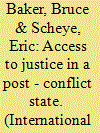

|
|
|
|
|
| Publication |
2009.
|
| Summary/Abstract |
Post-conflict governments and donors prioritize rebuilding the justice sector through state delivered rule of law and access to justice programmes. Misunderstanding the nature of the post-colonial state, such programmes make questionable assumptions. First, that a lack of access to state justice is the same as an overall absence of justice. Second, that the state system that is being built is what people want. Third, that the state system of justice that is being built could provide a sustainable nationwide network in the foreseeable future. Based on interviews conducted with policy designers, practitioners, local people and chiefs at three sites in southern Sudan 2007, this article calls for a rethinking of donor-supported justice and police development and advocates an approach that recognizes the importance of local justice.
|
|
|
|
|
|
|
|
|
|
|
|
|
|
|
|
| 2 |
ID:
075215
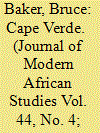

|
|
|
|
|
| Publication |
2006.
|
| Summary/Abstract |
This article examines the substance behind the claim that Cape Verde, a small archipelago state off the west coast of Africa, is the best country in Africa for political rights and civil liberties. Based on interviews conducted with 22 key informants in government, the judiciary, the legislature and civil society, it explores the electoral process, the political parties, the functioning of the National Assembly, civil and political rights, the judicial system, civil society and economic equality. It finds that Cape Verde's unique geography and history have played a key role in facilitating good governance, and an open and non-violent society that values the real political gains of 1991. However, democracy has not yet eradicated either gender discrimination, dependence on the diaspora or poverty.
|
|
|
|
|
|
|
|
|
|
|
|
|
|
|
|
| 3 |
ID:
103117
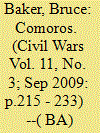

|
|
|
|
|
| Publication |
2009.
|
| Summary/Abstract |
The Comoros archipelago has had a troubled political history with territorial division at independence and, for the state of Comoros, repeated coups and a recent attempted secession. The article analyses the structural and contingent factors behind the susceptibility to conflict. It finds that the political and economic weaknesses that provoke conflict remain unaddressed and that these have been exacerbated by a failure of governance by government and civil society. Consequently, Comoros has failed to achieve viability and with it stability. The conclusion asks whether state viability in the western sense can be achieved or whether a hybrid form of governance should be supported. Currently the unresolved post-conflict issues look likely to spark further political crises and possibly violence.
|
|
|
|
|
|
|
|
|
|
|
|
|
|
|
|
| 4 |
ID:
020221
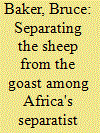

|
|
|
|
|
| Publication |
2001.
|
| Description |
66-86
|
|
|
|
|
|
|
|
|
|
|
|
|
|
|
|
| 5 |
ID:
116129
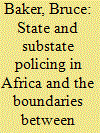

|
|
|
|
|
| Publication |
2012.
|
| Summary/Abstract |
Following an overview of the diverse substate policing sector in Africa and the main changes taking place within it, there follows an examination of the complex and dynamic boundaries between state and substate. The boundaries are at times imagined. States are constantly engaged in constructing an image of policing and its boundaries that does not correspond with reality. The boundaries are also permeable: authority, activities and agents pass across the boundary. State and substate are not clearly separated. Such is the geographical overlapping of policing agencies that Africans commonly move into and out of spheres of policing providers. The boundaries are also shifting. Boundaries between public and private, between legal and illegal and between state and substate are subject to ongoing power struggles and negotiation that result in change and reconstruction. The article concludes with some remarks about the potential and risks of utilising substate policing agencies.
|
|
|
|
|
|
|
|
|
|
|
|
|
|
|
|
| 6 |
ID:
142549
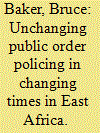

|
|
|
|
|
| Summary/Abstract |
This article offers a political analysis of the practices and motives of public order policing in Ethiopia and Uganda. It offers an explanation of the continuation of forceful tactics against political protest in a context of changing methods of information gathering, organisation and mobilisation by urban activists resulting from their access to internet and communication technology. It finds the two regimes, as anocracies, are caught between legally allowing protest and yet, conscious of their fragility, determined to crush opposition. For the latter approach, their militarist leaderships rely heavily on continued police violence. The paper concludes that failure of the police to adapt their public order policing to the new protest environment leaves them increasingly ineffective and unpopular. It is likely to provoke an escalation of violence and may both undermine the legitimacy of their regimes and reverse their attempts to open political space that justified their rebellions against former autocracies.
|
|
|
|
|
|
|
|
|
|
|
|
|
|
|
|